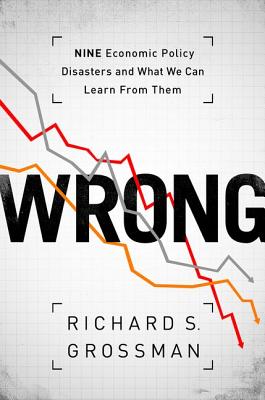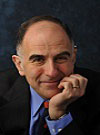

 Oxford University Press, USA
Oxford University Press, USA
Wrong: Nine Economic Policy Disasters and What We Can Learn from Them


Key Metrics
- Richard S Grossman
- Oxford University Press, USA
- Hardcover
- 9780199322190
- 8.4 X 5.86 X 1 inches
- 0.9 pounds
- Business & Economics > Economic History
- English
 Secure Transaction
Secure TransactionBook Description
In recent years, the world has been rocked by major economic crises, most notably the devastating collapse of Lehman Brothers, the largest bankruptcy in American history, which triggered the breathtakingly destructive sub-prime disaster. What sparks these vast economic calamities? Why do our economic policy makers fail to protect us from such upheavals?
In Wrong, economist Richard Grossman addresses such questions, shining a light on the poor thinking behind nine of the worst economic policy mistakes of the past 200 years, missteps whose outcomes ranged from appalling to tragic. Grossman tells the story behind each misconceived economic move, explaining why the policy was adopted, how it was implemented, and its short- and long-term consequences. In each case, he shows that the main culprits were policy makers who were guided by ideology rather than economics. For instance, Wrong looks at how America's unfounded fear of a centralized monetary authority caused them to reject two central banks, condemning the nation to wave after wave of financial panics. He describes how Britain's blind commitment to free markets, rather than to assisting the starving in Ireland, led to one of the nineteenth century's worst humanitarian tragedies- the Irish famine. And he shows how Britain's reestablishment of the gold standard after World War I, fuelled largely by a desire to recapture its pre-war dominance, helped to turn what would otherwise have been a normal recession into the Great Depression. Grossman also explores the Smoot-Hawley Tariff of 1930, Japan's lost decade of the 1990s, the American subprime crisis, and the present European sovereign debt crisis.
Economic policy should be based on cold, hard economic analysis, Grossman concludes, not on an unquestioning commitment to a particular ideology. Wrong shows what happens when this sensible advice is ignored.
Author Bio
Richard Grossman conducts research in economic history, although the questions he pursues are inspired by current policy issues in macroeconomics, banking, and finance. In particular, he focus on the links between the financial sector and aggregate economic activity and on how economic and political forces shape financial structure. He writes regularly about contemporary and historical economics.
Richard S. Grossman is Professor of Economics at Wesleyan University in Middletown, CT and a Visiting Scholar at the Institute for Quantitative Social Science at Harvard University. He is the author of Unsettled Account: The Evolution of Banking in the Industrialized World since 1800 (Princeton University Press, 2010) and WRONG: Nine Economic Policy Disasters and What We Can Learn from Them (Oxford University Press, 2013). He teaches classes in American and European Economic History, Macroeconomics, and Money and Banking. He graduated magna cum laude from Harvard College, holds an M.Sc.Econ. degree in Economic History from the London School of Economics and Political Science of the University of London, and A.M. and Ph.D. degrees in Economics from Harvard University.
Prior to joining the faculty at Wesleyan, he worked as an international economist at the United States Department of State. He has held visiting faculty appointments at Harvard, Yale, and the Hebrew University of Jerusalem, and has received research support from the National Science Foundation and the German Marshall Fund of the United States and was a 2013 Fellow of the John Simon Guggenheim Memorial Foundation.
He has worked and consulted on Wall Street and has testified as an expert witness in federal court. He has been published in the American Economic Review, Journal of Economic History, Journal of Money, Credit, and Banking, Journal of Financial and Quantitative Analysis, and other scholarly journals. His op-eds have appeared in the Wall Street Journal, Boston Globe, USA Today, and other newspapers and he has appeared on local, national, and foreign radio and TV.
He is a research fellow at the Centre for Economic Policy Research in London, a research network fellow of CESifo in Munich, a member of the International Advisory Board of the Queen’s University Centre for Economic History in Belfast, and an associate editor for socioeconomics, health policy, and law at the journal Neurosurgery.
Source: Wesleyan University
Videos
No Videos
Community reviews
Write a ReviewNo Community reviews